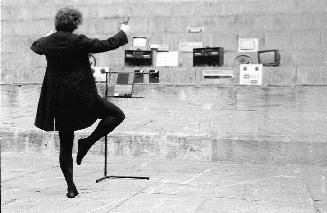Leigh Landy
holds a Research Chair at De Montfort University where he directs the Music, Technology and Innovation Research Centre. His compositions include several for video, dance and theatre. One of the main foci of his work is text-sound composition. Currently he is artistic director of Idée Fixe – Experimental Sound and Movement Theatre. His publications focus on the studies of electroacoustic music, in particular issues related to making this music accessible. He is editor of Organised Sound: an international journal of music technology (Cambridge University Press) and author of five books including What’s the Matter with Today’s Experimental Music? (1991) and Experimental Music Notebooks (1994). Understanding the Art of Sound Organization (MIT Press) and La musique des sons/The Music of Sounds (Sorbonne MINT/OMF) both appeared in 2007. He directs the ElectroAcoustic Resource Site (EARS) project and is a founding member of the Electroacoustic Music Studies Network (EMS).
Rock’s Music (1988, for stereo recording and speaking voice)
MP3
Not only has Gertrude Stein been influential, she has occasionally provided the source material for my pieces. Some Stein texts form the basis of ‚Rock’s Music‘. (Stein in German = rock in English.) The music can be found in the texts‘ own sounds. The composition is based on the re-composition of her texts. Hundreds of snippets were taken from: ‘Lifting Belly’ (1915/17), ‘Patriarchal Poetry’ (1927) and ‘As a Wife Has a Cow: a Love Story’ (1926). Influenced by Samuel Beckett’s famous play, ‘Krapp’s Last Tape’, the performer is in conversation with himself through a recording. There the comparison ends. What inspired the piece is how Stein was writing texts that not only predicted minimal music several decades before it was born, but in her case there is something else: what sounds like repetition is anything but that. As the number of voices increases, the ability to follow things decreases and, sometimes, Schaefferian reduced listening is the unexpected place where one arrives. This piece, normally presented with a live performer and two pre-recorded channels (one diffused from an unexpected place in the space), is the composer’s most frequently performed work.
Live voice, voices on tape – Leigh Landy; recorded 1992, remastered 2009.
